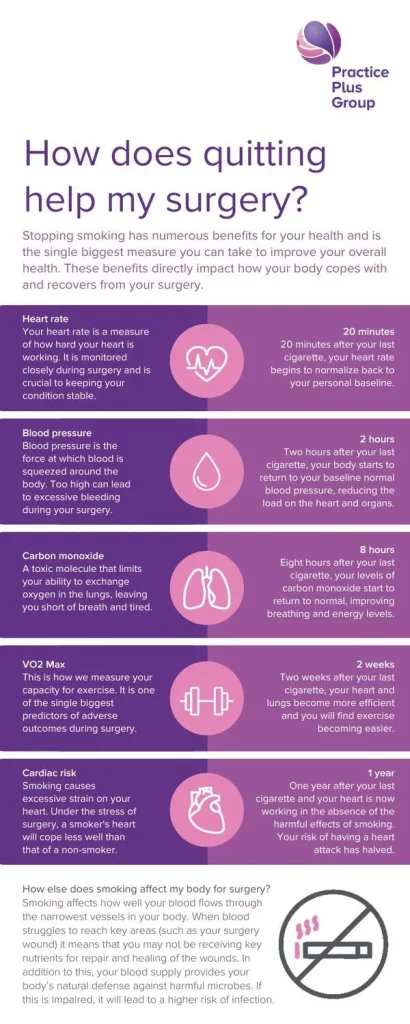Estimated reading time: 4 minutes
It’s common knowledge nowadays that smoking is bad for you. It causes disease, it’s an increasingly expensive habit, and it makes your clothes smell. So, it should come as no surprise to learn that stopping smoking before surgery is a very good idea.
In this blog we explore why, the benefits of doing so, and what happens if you don’t.
Can you smoke before surgery?
All the sources on this topic advise (in the strongest terms) to refrain from smoking before surgery. Even stopping a few days before your operation can aid your recovery and reduce the risk of developing post-surgery complications.
Did you know?
It’s estimated that 1 in 8 adults in the UK smoke.1
What happens if I smoke before surgery? The risks
There’s no getting away from it: smoking increases the risk of complications following surgery. Patients that smoke before surgery are at risk of developing blood clots, heart problems, and pneumonia. There is also the increased likelihood of problems after surgery during your recovery. Below we take a closer look at what this entails.
Heart problems
It’s estimated that 175,000 people die in the UK every year from heart-related diseases.2 Of those, the British Heart Foundation say over 15,000 of these are attributed to smoking.3
Smoking puts more strain on the heart as it has to work harder to pump blood around the body. This is because tobacco disturbs and inflames both the heart and blood vessels, which in turn, increases heart rate and blood pressure. A Journal of American Medical Association study found that smokers are 77% more likely to have a heart attack following surgery than non-smokers.
Lung and breathing problems
Smoke-related breathing issues can put patients at a higher risk of developing pneumonia before and after their surgery. It’s even possible that due to decreased lung function, patients may require the use of a ventilator to help them breathe.
Chest infections, breathing problems, and decreased lung capacity are all potential issues facing patients who smoke before or after their surgery.
Increased risk of blood clots
One major concern during surgery is the risk of blood clots. Smoking causes artery walls to become sticky thanks to the various chemicals found in cigarettes. This sticky, fatty material accumulates, reducing the space through which blood can flow. When arteries become clogged, the risk of blood clotting increases.
Carbon monoxide delays healing
According to The National Library of Medicine (and countless other studies from the past 60 years), the carbon monoxide found in cigarette smoke has been shown to negatively affect cells important to the post-operative healing process.4
It has been categorically proven that stopping smoking before surgery leads to improved rates of recovery and decreased risk of wound infection.5
Nicotine raises blood pressure
As you’ll probably know, nicotine is an addictive substance. It causes withdrawal symptoms if more isn’t ingested on a regular basis. It also causes blood pressure and adrenaline levels to increase. This, in turn, can raise the risk of heart attack.
Lower immunity
Another negative consequence of smoking is a lowered immune system. This is brought about by an imbalance in the body as smokers need additional antioxidants to combat the chemicals ingested through smoking. This often means smokers need more vitamin C than non-smokers along with other nutrients.
Deficits in vital nutrients inevitably lead to an increased risk of developing post-surgery infections. This can slow the healing process and potentially lead to serious complications.

Does smoking interfere with anaesthesia?
In a word: yes. One of the roles of anaesthesia is to reduce coughing and spasms after surgery. Working against this is the tar from tobacco smoke which irritates the lungs, causing the smoker to cough. Smokers therefore need a higher dose of anaesthesia than non-smokers, which increases the risk of post-surgery complications.
How long to stop smoking before surgery
The simple answer to this is: right now. The longer you can give your lungs and body to recover from a smoking habit, the better. However, we know how difficult giving up smoking can be. With that in mind, while the aim should be to quit at least four weeks before surgery, even stopping a few days before will give your body the opportunity to start recovering.

How long before surgery should I stop smoking cigarettes?
All the studies and textbooks point to stopping smoking between four and six weeks before your surgery. Not only will this stand you in good stead for quitting permanently, you’ll also benefit from:
- increased likelihood of your operation going ahead as planned
- reduced risk of lung, heart, and infection problems after your operation
- not needing as much anaesthetic as a smoker.
Can I vape before surgery?
As with smoking, vaping should be avoided before surgery. This is because vapes, along with their cigarette cousins, increase the risk of heart and breathing issues during surgery.
Is vaping zero nicotine before surgery ok?
While the medical community is a little more lenient towards zero nicotine vaping, the advice is still to avoid using them before surgery.
The benefits of stopping smoking before your operation
Enough from us about the perils of pre-surgery smoking, time to listen to the expert on the matter.
“For some patients, preparing for surgery offers a good opportunity to focus on their all-round health. Making lifestyle changes can help speed up their recovery from surgery and offer an overall improvement in well-being.
Stopping smoking is one of the most effective ways to improve overall health. Focusing on the benefits it will bring when recovering from surgery might be the additional nudge necessary to do so. We have advice and support for any of our patients who want to take this step towards better overall health.”
Shen Tisdale, Medical Director at Practice Plus Group Hospital, Plymouth
Support for quitting smoking prior to surgery
If you’re thinking of ditching the cigarettes, the good news is there’s more support now than ever before. From step-by-step plans to support groups, resources like the NHS feature a raft of useful information and content. And it’s all aimed at helping you kick the habit for good.
Tips for quitting
From dedicated apps to specialised plans, there really hasn’t been a better time to give up smoking. The NHS site has some great tips and advice, but if you’re looking for some quick guidance, you may find the following useful:
- use smoking aids like nicotine patches
- create a strong support network
- set a date you want to have quit by
- start exercising before surgery to mitigate potential weight gain from quitting.
Helpful resources
- https://www.nhs.uk/live-well/quit-smoking/nhs-stop-smoking-services-help-you-quit
- https://patient.info/healthy-living/quit-smoking-cessation/how-to-quit-smoking
- https://www.cancerresearchuk.org/get-involved/smokefreeuk
- https://ash.org.uk/about
- Smoking and cataract surgery guide
- Pre-habilitation for surgery guide
Sources and references
3 https://www.bhf.org.uk/informationsupport/risk-factors/smoking
4 https://www.ncbi.nlm.nih.gov/pmc/articles/PMC2903966/
5 https://www.ncbi.nlm.nih.gov/pmc/articles/PMC1422652/
6 https://www.nth.nhs.uk/resources/preparing-for-your-surgery-stopping-smoking/

Acknowledgements
FAQs about smoking before an operation
Not quite found the information you’re looking for? Not to worry, our dedicated smoking before surgery FAQs may be able to help!
While you’re unlikely to drop dead if you light up before your operation, it is strongly advised that you stop smoking at least four weeks beforehand. Not doing so will increase your risk of developing complications during and after the surgery.
Not necessarily. However associated issues may not only lead to surgery being cancelled, but will likely lead to a patient being limited in where they can have elective procedures due to the likelihood of post-operative complications.
The longer you can go without smoking following your surgery, the better it will be for your recovery and overall health – and, of course, your wallet!
If you must light up again, your doctor will likely advise leaving it for at least a couple of weeks.






